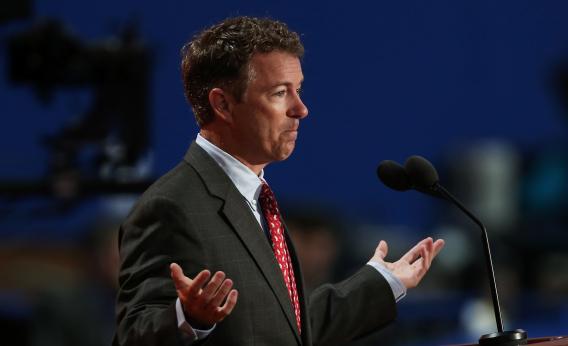The biggest Hagel news of the afternoon was the vote of Sen. Susan Collins. Yes on cloture, no on the nominee. The biggest Hagel news of the evening comes from Sen. Rand Paul, whose father’s 2008 campaign—the one that facilitated the senator’s new career—grew out of paleoconservative opposition to the Iraq War.
The conservative Republican from Kentucky said in an interview to air on CNN’s “Erin Burnett OutFront” that his unanswered questions on Hagel – particularly speaking fees Hagel received since leaving the Senate – rise to the level where he might set a roadblock to the former senator’s nomination. “If they’re not going to give us the information, the only way to get the information is to threaten to hold them to a higher standard of sixty votes,” he said in the interview.
Paul had politely evaded questions about whether he’d vote for cloture—starting debate on the nomination, which requires 60 votes. “Are you only supposed to rule out and vote against people who you think are criminal or have unpatriotic backgrounds?” Paul told me last week. “Are you supposed to rule out people you disagree with politically? In the past there’s been some latitude for presidents.”
But in the days since, as Joe Morton reports, Republican leaders have been sounding out the caucus for one last anti-Hagel push. They frame this not as a filibuster—not as a permanent scuttling of the nomination—but as a reasonable request for more information. In doing so, as the often-derided* Jennifer Rubin predicted, they have provided senators who don’t plan to block the nomination with an excuse to do so through the weekend. This second CNN story makes it a little bit confusing.
McCain’s vote is important because he is one of the leading Republicans on military matters and other senators are expected to follow his lead. But he was also one of just five GOP senators who publically announced they would not filibuster Hagel. If he supports the filibuster, it could be impossible for Hagel to get 60 votes.
It could be impossible for him to get 60 1) unless McCain and Graham keep shifting the goalposts and 2) as long as the Senate leadership brings every wavering member along, out of deference to the document requests (the thus-far quixotic quest for controversial new Hagel speeches and donations) and to McCain’s Benghazi demands. I reported earlier today that Georgia Sen. Johnny Isakson was making his filibuster vote conditional on McCain. Senators who’ve been cool to a filibuster, like Alaska Sen. Lisa Murkowski, haven’t rushed to clarify their positions.
But you can see the argument evolving. This morning, Missouri Sen. Roy Blunt told Mike Allen not that he would filibuster Hagel—he’s said he wouldn’t—but that 40-odd Republicans might, you know, decide not to end the debate this week.
“There are 40 votes,” said Blunt, “not to send that as the permanent standard, but 40 votes that says, it’s too quick to end the debate on this nomination, because reasonable things have been asked for that hasn’t been provided.”
Are you tired of reading the same words over and over again? Me too! But the gist remains: Republicans don’t have the votes to kill the Hagel nomination, and are trying to cobble together the votes to delay it and coax more information out of the White House. If you read an apocalyptic headline like “GOP FILIBUSTERS HAGEL,” it will be true, technically, and Democrats want that story out there. As he started the cloture countdown today, setting up a Friday (or early Saturday) vote, Harry Reid called this an “unprecedented” filibuster. The Democrats’ best weapon is shame. And the Republicans’ best weapon, as they wait for more Benghazi info or some miracle dirt on Hagel, is embarrassment. They make this as difficult as possible for Obama.
*by me, sometimes!
